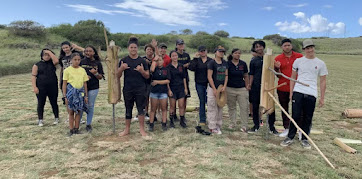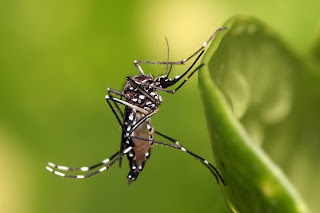 |
| Thanksgiving in traditional Hawai'i is the Makahiki Season, with games and an appreciation of agriculture and peacemaking. Makahiki events are being held this year in Kaʻū. |
A HAWAI'I THANKSGIVING WAS DECLARED in 1849, as a a national holiday in the Kingdom of Hawai‘i by King Kamehameha III. "This was 14 years before President Lincoln had declared Thanksgiving a national holiday in the United States. Going even further back, before European influence and the introduction of the American Thanksgiving to Hawai‘i, Hawaiians had their own version of the harvest season holiday," according to a story in Honolulu Magazine. It was the Makahiki.
The November 1967 edition reported that "The Makahiki was a three-month-long festival celebrating the return of Lono, the Hawaiian god of agriculture and peace.
The festival season officially began on the first night of the 11th month and ended on the last night of the first month. Before the festival, everyone would gather their crops and pay their taxes in food, live animals or other fruits or products of their particular crafts. Once Makahiki began, men, women, chiefs and royalty would cast aside everyday work, religious observances and even war to mingle and enjoy the festivities, which included week after week of grand feasts, boxing tournaments and other sports, games and activities, music and dancing."
 |
| Area schools participated in Makahiki Games on Tuesday. Photo from Kahua Olohu Stewardship Committee |
This year, the Makahiki Grounds between Nāʻālehu and Honu'apo were the site of Makahiki games for students from area schools this past Tuesday. See http://kaunewsbriefs.blogspot.com/2022_11_22_archive.html/. The Makahiki Run through Kaʻū, carrying the wooden image of Lono, took place Nov. 12. See http://kaunewsbriefs.blogspot.com/2022_11_12_archive.html.
A Makahiki Festival at Punalu'u Beach Park is planned for Dec. 3 and 4 with free food, drinks, Makahiki games, music and hula from 9 a.m. to 9 p.m. With the New Year, as part of the Makahiki season, Vibrant Hawai'i and Resilience Hubs in Kaʻū will host a session on future planning for the district. It will take place on Saturday, Jan. 21 from 10 a.m. to 1 p.m. at Na'alehu Hongwanji, 95-5698 Hawai'i Belt Road - Hwy. 11.
Hau'oli Lā Ho'omaika'i means Happy Thanksgiving.
To read comments, add your own, and like this story, see www.facebook.com/kaucalendar. See latest print edition at wwwkaucalendar.com. See upcoming events at https://kaunewsbriefs.blogspot.com/2022/04/upcoming-events-for-kau-and-volcano.html.
SEN. MAZIE HIRONO'S THANKSGIVING MESSAGE IS:"Today, let us reflect on our nations' history of colonization and the impact it continues to have on Native communities—including learning the true First Thanksgiving of the Wampanoag Peoples and English settlers. We can all do more to listen to and support Indigenous communities."
 |
| Rep. Kai Kahele and Joe Biden |
 |
| Malia Kekai, new Deputy Director of county Department of Public Works. Photo from County of Hawai'i |
Mayor Mitch Roth said, “We’re excited to bring Malia on as Deputy of our Department of Public Works as we continue to strive towards a thriving Hawaiʻi Island. She has proven herself a vital asset to our Corporation Counsel, and we know she will continue to bring a balanced, thoughtful, and, most importantly, local perspective to her new position in Public Works.”
Kekai was born and raised on Maui and graduated from Maui High School. She received a Bachelor of Arts from the University of Hawaiʻi at Mānoa in Communications and Hawaiian Studies. She received her Juris Doctor degree from Southwestern Law School in Los Angeles, California.
There have been 737 major accidents so far this year compared with 718 during the same period last year, an increase of 2.6 percent.
To date, there were 31 fatal crashes (one fatal crash reclassified on May 30 due to a medical condition) resulting in 33 fatalities (one of which had multiple deaths, and one reclassified due to a medical condition), compared with 25 fatal crashes, resulting in 25 fatalities for the same time last year. This represents an increase of 24 percent for fatal crashes, and 32 percent for fatalities.
HPD promises that DUI roadblocks and patrols will continue island wide.
 |
| 'I'iwi, a Hawaiian honeycreeper, threatened by mosquitoes that spread avian malaria. Photo by Jack Jeffrey/ American Bird Conservancy |
RIDDING THIS ISLAND OF MOSQUITOES IS FOR THE BIRDS, say Kahuku Coffee Talk presenters, who explained the goal of a Birds Not Mosquitoes group last Saturday. The organization’s goal is to eradicate a mosquito species that carries the avian malaria parasite from all of the Hawaiian Islands' forest areas, where native Hawaiian birds live.
 |
| Evelyn Wight of The Nature Conservancy and Chris Farmer of American Bird Conservancy at Kuhuku Unit of Hawai'i Volcanoes National Park. Photo by Peter Bosted |
According to Farmer, before avian malaria was introduced the Honeycreepers in Hawai’i embodied an explosion of diversity unseen elsewhere. Birds have been evolving on the islands for about six to seven million years. At one time, there were 55 Honeycreepers, all with a huge diversity of plumages, bills and other adaptations.
“The Galapagos islands, where Darwin made his famed studies of the evolution of finch, had nothing on the huge evolution among the birds on these islands,” he explained.
Farmer said that of the six species of mosquito that bite people on this island, only one species, the Aedes aegypti, carries malaria and threatens the birds. Over the millions of years that Honeycreepers have been evolving, they have lost their resistance to malaria as that trait was never needed. Then, suddenly, overnight, in 1826, malaria and the Aedes aegypti mosquitoes were on the islands. The birds succumbed in droves and many species were wiped out. However, the mosquito and the malaria parasite are both cold intolerant. Thus the only birds that could survive were those who lived high above the range of the Aedes aegypti mosquitoes, high enough on Mauna Loa where it is too cold for the insects and for the malaria parasite.
Over the past 40 years, according to Farmer, climate change has been impacting the birds again. As the earth warms, the cold intolerant Aedes aegypti mosquitoes can migrate further up the mountain and infect birds that were previously beyond their range. The mortality rate for the birds has been extremely high, and some species are dangerously close to extinction.
 |
| Hawai'i Akepa. Photo by Richard Armeding |
Scientists in Florida have been testing bacteria-infested Aedes aegypti mosquitoes with the aim of eradicating viruses like dengue, Zika, yellow fever and chikungunya that pose a danger to humans, explained Wight and Farmer. According to them, scientists have developed the Incompatible Insect Technique, which is used on male aedes aegypti mosquitoes.
This technique is explained on the website for the Centers for Disease Control and Prevention. First, scientists introduce a bacteria named Wolbachia into Aedes aegypti mosquito eggs. From these eggs, mosquitoes with Wolbachia are bred. Male and female mosquitoes with Wolbachia are sorted - only males are released. The females are not released, but may be used for breeding in the lab. Typically, when a male
 |
| Aedes aegypti mosquito. Photo from Wikipedia |
Wolbachia bacteria is not harmful to humans or animals. The CDC states: “In the United States, the use of mosquitoes with Wolbachia is regulated by the U.S. Environmental Protection Agency. Prior to release of mosquitoes with Wolbachia into an area, EPA must grant an Experimental Use Permit.
“Aedes aegypti mosquitoes spread viruses including dengue, Zika, and chikungunya. Aedes species of mosquitoes are common throughout many areas of the United States. EPA has registered mosquitoes with Wolbachia to evaluate how effective they are in reducing numbers of aedes aegypti mosquitoes, not other types of mosquitoes. Mosquitoes with Wolbachia are not genetically modified.”
THE ALOHA FRIDAY MARKETPLACE WILL OPEN in early December every Friday from 9 a.m. to 2 p.m. at Nāʻālehu Hongwanji Mission 95-5695 Mamalahoa Highway.
Aloha Friday Marketplace features Made in Hawai'i Products, Organic Produce, Creative Crafts, Art, Flowers and Plants, Food, Kaʻū Coffee, Gluten Free, Low Carb Goodies, Wellness Services and Products, Clothing, Hand Crafted Treats and more. For questions and vendor inquiries, email AlohaFridayMarket@gmail.com or text 808-256-3193.








